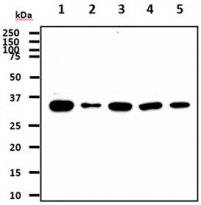ARG56990
anti-BRCC36 antibody [3B1]
anti-BRCC36 antibody [3B1] for Western blot and Human
Overview
| Product Description | Mouse Monoclonal antibody [3B1] recognizes BRCC36 |
|---|---|
| Tested Reactivity | Hu |
| Tested Application | WB |
| Host | Mouse |
| Clonality | Monoclonal |
| Clone | 3B1 |
| Isotype | IgG1, kappa |
| Target Name | BRCC36 |
| Antigen Species | Human |
| Immunogen | Recombinant fragment around aa. 1-316 of Human BRCC36. |
| Conjugation | Un-conjugated |
| Alternate Names | BRCA1/BRCA2-containing complex subunit 36; BRISC complex subunit BRCC36; BRCC36; CXorf53; BRCA1/BRCA2-containing complex subunit 3; Lys-63-specific deubiquitinase BRCC36; EC 3.4.19.-; C6.1A; BRCA1-A complex subunit BRCC36 |
Application Instructions
| Application Suggestion |
|
||||
|---|---|---|---|---|---|
| Application Note | * The dilutions indicate recommended starting dilutions and the optimal dilutions or concentrations should be determined by the scientist. |
Properties
| Form | Liquid |
|---|---|
| Purification | Purification with Protein G. |
| Buffer | PBS (pH 7.4), 0.02% Sodium azide and 10% Glycerol. |
| Preservative | 0.02% Sodium azide |
| Stabilizer | 10% Glycerol |
| Concentration | 1 mg/ml |
| Storage Instruction | For continuous use, store undiluted antibody at 2-8°C for up to a week. For long-term storage, aliquot and store at -20°C. Storage in frost free freezers is not recommended. Avoid repeated freeze/thaw cycles. Suggest spin the vial prior to opening. The antibody solution should be gently mixed before use. |
| Note | For laboratory research only, not for drug, diagnostic or other use. |
Bioinformation
| Database Links |
Swiss-port # P46736 Human Lys-63-specific deubiquitinase BRCC36 |
|---|---|
| Gene Symbol | BRCC3 |
| Gene Full Name | BRCA1/BRCA2-containing complex, subunit 3 |
| Background | This gene encodes a subunit of the BRCA1-BRCA2-containing complex (BRCC), which is an E3 ubiquitin ligase. This complex plays a role in the DNA damage response, where it is responsible for the stable accumulation of BRCA1 at DNA break sites. The component encoded by this gene can specifically cleave Lys 63-linked polyubiquitin chains, and it regulates the abundance of these polyubiquitin chains in chromatin. The loss of this gene results in abnormal angiogenesis and is associated with syndromic moyamoya, a cerebrovascular angiopathy. Alternative splicing results in multiple transcript variants. A related pseudogene has been identified on chromosome 5. [provided by RefSeq, Jun 2011] |
| Function | Metalloprotease that specifically cleaves 'Lys-63'-linked polyubiquitin chains. Does not have activity toward 'Lys-48'-linked polyubiquitin chains. Component of the BRCA1-A complex, a complex that specifically recognizes 'Lys-63'-linked ubiquitinated histones H2A and H2AX at DNA lesions sites, leading to target the BRCA1-BARD1 heterodimer to sites of DNA damage at double-strand breaks (DSBs). In the BRCA1-A complex, it specifically removes 'Lys-63'-linked ubiquitin on histones H2A and H2AX, antagonizing the RNF8-dependent ubiquitination at double-strand breaks (DSBs). Catalytic subunit of the BRISC complex, a multiprotein complex that specifically cleaves 'Lys-63'-linked ubiquitin in various substrates. Mediates the specific 'Lys-63'-specific deubiquitination associated with the COP9 signalosome complex (CSN), via the interaction of the BRISC complex with the CSN complex. [UniProt] |
| Calculated MW | 36 kDa |
Images (1) Click the Picture to Zoom In






